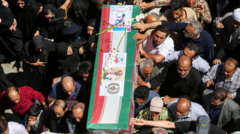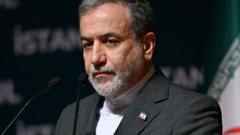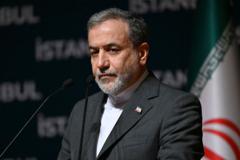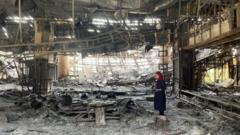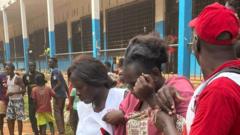In the aftermath of a grueling conflict with Israel, Tehran is experiencing a fragile resurgence. The Boof café, located within the former US embassy, serves as a poignant reminder of the city’s complex relationship with America, where barista Amir hopes for better diplomatic ties, reflecting the broader sentiment of many Iranians. However, the serenity of café life contrasts sharply with the pervasive fear following recent Israeli missile strikes that have devastated key infrastructure, including the state’s TV headquarters.
Tehran's Uneasy Resilience: Citizens Wield Hope Amidst Chaos

Tehran's Uneasy Resilience: Citizens Wield Hope Amidst Chaos
As Israel's military strikes shake Iran, residents of Tehran find solace in small cafés but remain haunted by uncertainty.
In hospitals, frontline workers battle overwhelming trauma as they treat the multitude of casualties resulting from the strikes. Nurse Ashraf Barghi, who witnessed some of the worst injuries in her career, shares her anxiety over potential new attacks. The grim reality of recent casualties underscores the psychological toll on residents as they navigate their daily lives in a city scarred by conflict.
Despite this tumult, elements of normalcy are gradually returning. Streets are bustling with activity once more, as people venture out to resume their routines. Yet amidst this bustling façade, many citizens express profound sorrow and uncertainty about their future. Missed opportunities for peace resonate through the hearts of many, including young Mina, who struggles to envision a brighter horizon.
Even as they come together in cultural events, such as concerts at the iconic Azadi tower, Iranians voice their desires for freedom and change, challenging their leaders. Ultimately, Tehran stands at a crossroads, urging its residents to bridge their aspirations with the thorny realities ahead.
In exploring Tehran’s dichotomy of resilience and vulnerability, one thing becomes clear: the spirit of its people remains unbroken, even as they brace for what lies ahead.
---
In the heart of the Iranian capital, the Boof café serves up refreshing cold drinks on a hot summer's day. Its location within the long-shuttered US embassy serves as a constant reminder of the tense relations that began with the 1979 Iranian revolution and the hostage crisis. Barista Amir expresses a desire for improved relations between Iran and the US, noting that sanctions deeply affect his community. The café, with only two tables occupied, captures a snapshot of Tehran’s uncertain climate.
A short drive away, the state TV station IRIB is reeling from recent Israeli strikes. In a speech broadcasted to the nation, Supreme Leader Ayatollah Ali Khamenei faced the American adversary, asserting that they desire Iran's surrender. The remnants of the IRIB compound, a now charred haven, symbolize a dark chapter in the ongoing conflict. Nurse Ashraf Barghi details the trauma faced at hospitals treating victims, while Morteza shares his own harrowing experience after a missile hit Evin prison.
Despite the uncertainty hanging heavy in the air, Tehran’s streets are gradually filling again with life. Shops and bazaars reopen as many return to debris-laden streets and crowded public spaces. Yet, amidst this semblance of normalcy, the psychological scars remain; young Mina reveals her heartbreak over a future clouded by fear and the impacting realities of war.
As the Tehran Symphony Orchestra plays beloved patriotic songs at the iconic Azadi tower, citizens from diverse backgrounds gather, their shared worries about the future transcending individual beliefs. Many express the urgent need for their leaders to heed the voices of the populace as they yearn for a life of greater freedoms amid ongoing threats. Iranians continue to navigate challenging paths forward, buoyed by defiance and a yearning for change amid a reality that can seem overwhelming.
Despite this tumult, elements of normalcy are gradually returning. Streets are bustling with activity once more, as people venture out to resume their routines. Yet amidst this bustling façade, many citizens express profound sorrow and uncertainty about their future. Missed opportunities for peace resonate through the hearts of many, including young Mina, who struggles to envision a brighter horizon.
Even as they come together in cultural events, such as concerts at the iconic Azadi tower, Iranians voice their desires for freedom and change, challenging their leaders. Ultimately, Tehran stands at a crossroads, urging its residents to bridge their aspirations with the thorny realities ahead.
In exploring Tehran’s dichotomy of resilience and vulnerability, one thing becomes clear: the spirit of its people remains unbroken, even as they brace for what lies ahead.
---
In the heart of the Iranian capital, the Boof café serves up refreshing cold drinks on a hot summer's day. Its location within the long-shuttered US embassy serves as a constant reminder of the tense relations that began with the 1979 Iranian revolution and the hostage crisis. Barista Amir expresses a desire for improved relations between Iran and the US, noting that sanctions deeply affect his community. The café, with only two tables occupied, captures a snapshot of Tehran’s uncertain climate.
A short drive away, the state TV station IRIB is reeling from recent Israeli strikes. In a speech broadcasted to the nation, Supreme Leader Ayatollah Ali Khamenei faced the American adversary, asserting that they desire Iran's surrender. The remnants of the IRIB compound, a now charred haven, symbolize a dark chapter in the ongoing conflict. Nurse Ashraf Barghi details the trauma faced at hospitals treating victims, while Morteza shares his own harrowing experience after a missile hit Evin prison.
Despite the uncertainty hanging heavy in the air, Tehran’s streets are gradually filling again with life. Shops and bazaars reopen as many return to debris-laden streets and crowded public spaces. Yet, amidst this semblance of normalcy, the psychological scars remain; young Mina reveals her heartbreak over a future clouded by fear and the impacting realities of war.
As the Tehran Symphony Orchestra plays beloved patriotic songs at the iconic Azadi tower, citizens from diverse backgrounds gather, their shared worries about the future transcending individual beliefs. Many express the urgent need for their leaders to heed the voices of the populace as they yearn for a life of greater freedoms amid ongoing threats. Iranians continue to navigate challenging paths forward, buoyed by defiance and a yearning for change amid a reality that can seem overwhelming.


